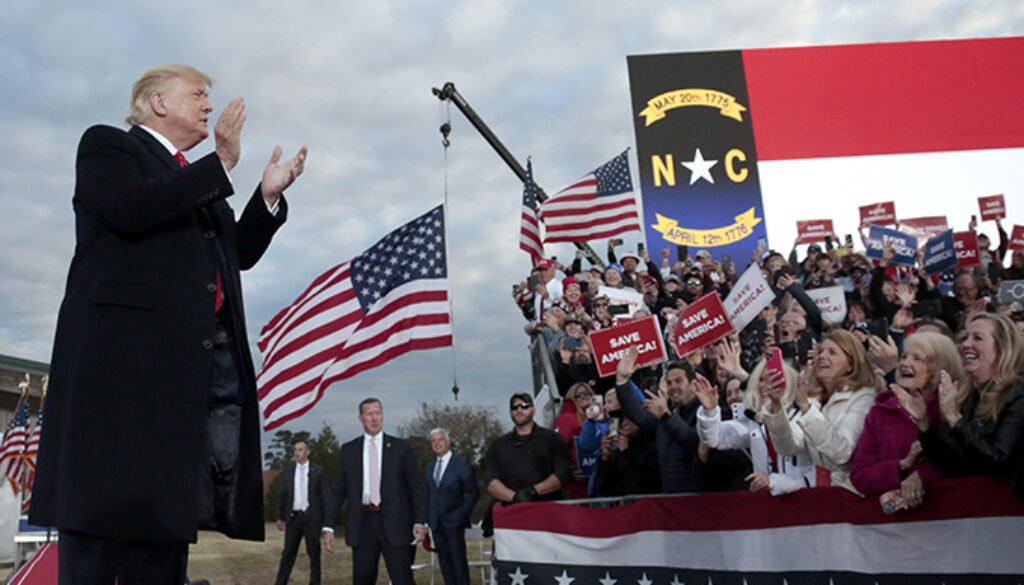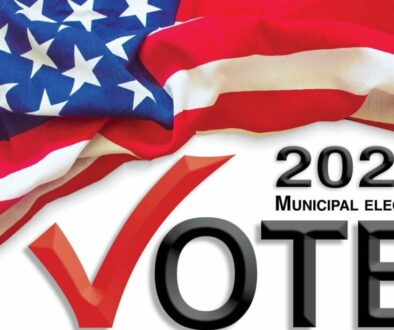Trump’s bid to shape GOP faces test with voters in May races
NEW YORK — Donald Trump ‘s post-presidency enters a new phase this month as voters across the U.S. begin weighing the candidates he elevated to pursue his vision of the Republican Party.
“The month of May is going to be a critical window into where we are,” said Maryland Republican Gov. Larry Hogan, a Trump critic defending incumbent GOP governors in Georgia, Ohio and Idaho against Trump-backed challengers this month. “I’m just concerned that there are some people trying to tear the party apart or burn it down.”
Few states may be a higher priority for Trump than Georgia, where early voting began on Monday ahead of the May 24 primary. He’s taken a particularly active role in the governor’s race there, recruiting a former U.S. senator to take on the incumbent Republican. For similar reasons, Trump is also aiming to unseat the Republican secretary of state.
While the primary season will play out deep into the summer, the first batch of races could set the tone for the year. If Republican voters in the early states rally behind the Trump-backed candidates, the former president’s kingmaker status would be validated, likely enhancing his power as he considers another bid for the presidency. High-profile setbacks, however, could dent his stature and give stronger footing to those who hope to advance an alternate vision for the GOP.
Texas Sen. Ted Cruz predicted a strong month of May for Trump and his allies.
“The voices in Washington that want him to fade into obscurity or to be silenced are engaged in their own form of wishful thinking,” Cruz said in an interview. “That’s not going to happen. Nor should he.”
As Republicans grapple with Trump, Democrats are confronting their own set of revealing primaries.
Candidates representing the Democrats’ progressive wing are yanking the party leftward while offering conflicting messages about how to overcome their acute political shortcomings, Biden’s weak standing chief among them. History suggests that Democrats, as the party that controls Washington, may be headed for big losses in November no matter which direction they go.
Florida Sen. Rick Scott, who leads the GOP’s effort to retake the Senate, described the month of May as a brutal sorting period likely to be dominated by Republican infighting instead of the policy solutions or contrasts with Democrats he’d like to see.
“The primaries too often become sort of character assassinations,” Scott said in an interview. “That’s what has happened.”
He added, “Hopefully, people come together.”
No race may be messier than the Republican primary election for Georgia’s governor. Trump has spent months attacking Republican incumbents Gov. Brian Kemp and Secretary of State Brad Raffensperger. He blames both men for not working hard enough to address election integrity issues relating to the 2020 presidential election.
Georgia Republican Lt. Gov. Geoff Duncan, a frequent Trump critic who is not running for reelection, described Trump’s decision to back former Sen. David Perdue against Kemp an “embarrassing” waste of time that could undermine the GOP’s broader goals this fall.
Duncan predicted Trump would ultimately win some races and lose others this month, but he was especially optimistic about Kemp’s chances to beat back Trump’s challenge.
“If a sitting governor is able to defeat that whole Donald Trump notion by a huge amount — and others down the ticket — I think we’re gonna send a message that it’s gonna take more than a Donald Trump endorsement to call yourself a Republican,” he said.
Six months before the general election, the Republican candidates in key primaries have already spent mountains of campaign cash attacking against each other as Democrats largely save their resources — and sharpest attacks — for the November.
In the Pennsylvania, where Trump-backed Dr. Mehmet Oz and former hedge fund executive David McCormick are locked in a fierce fight for the GOP nomination, the candidates and allied outside groups have spent more than $48 million on television advertising so far. Democrats spent just over $10 million.
And in North Carolina, Republican forces have spent more than $15 million on a divisive primary pitting Trump-backed Rep. Ted Budd against former Gov. Pat McCrory. Democrats, who have united behind former state Supreme Court Chief Justice Cheri Beasley, spent just over $2 million.
 Twitter
Twitter Facebook
Facebook Instagram
Instagram
